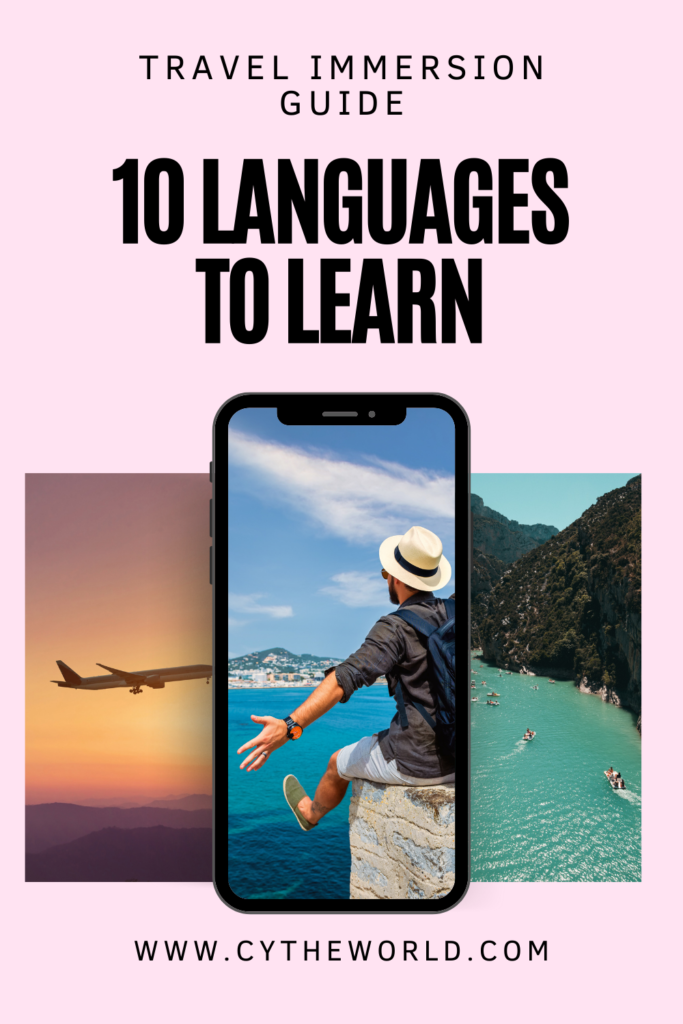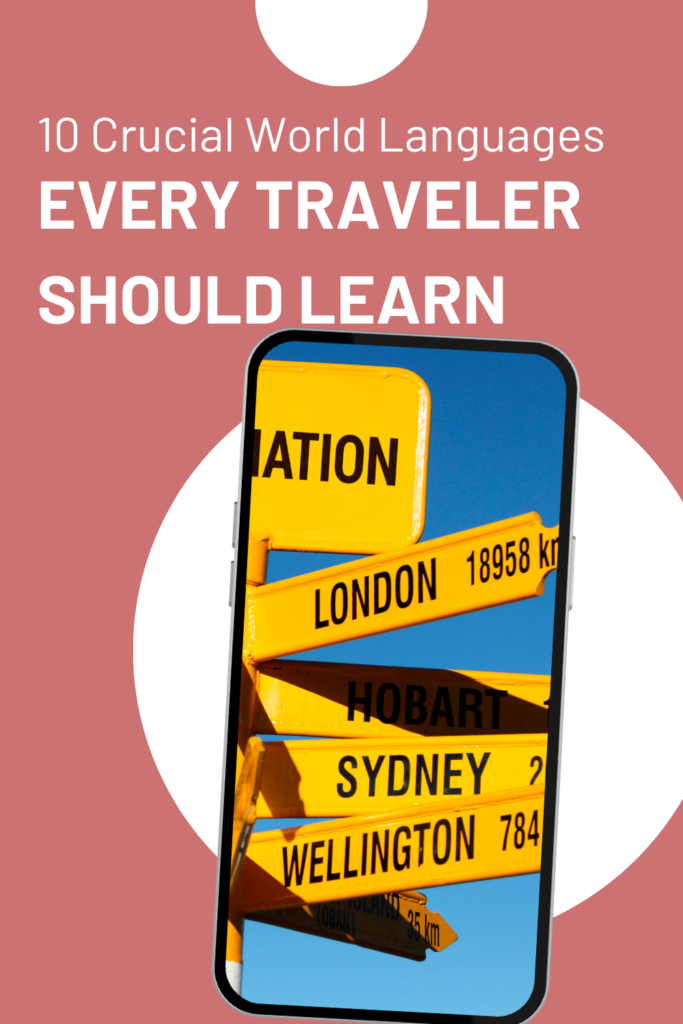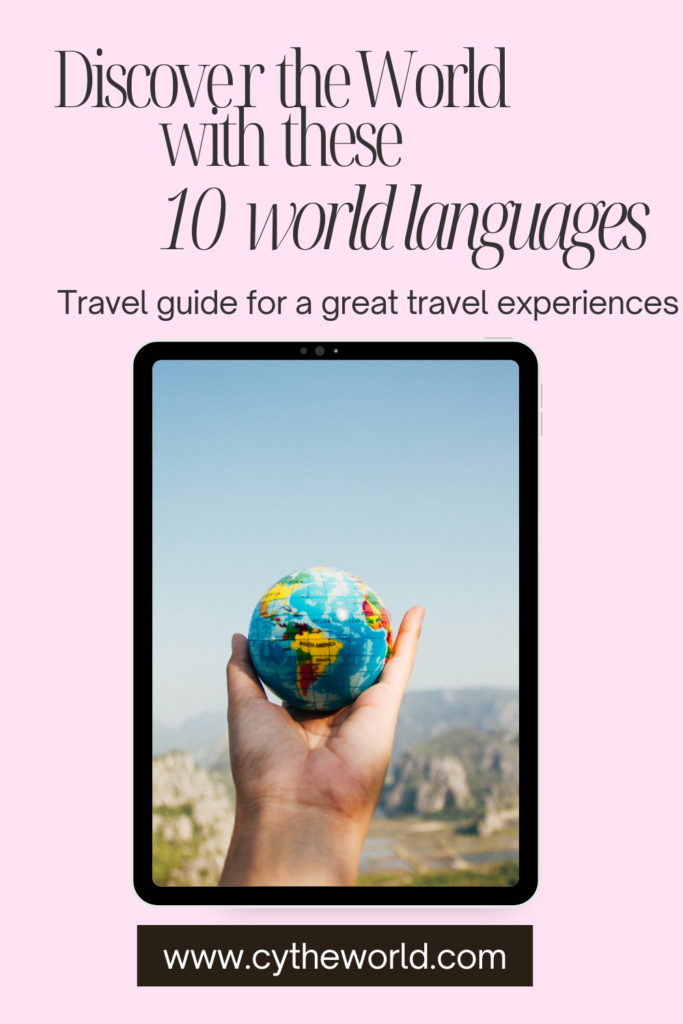Imagine just turning 20 years old and getting a job proposal with a salary of $95,000 or being a sophomore in college and getting an internship at WWE just because you speak Chinese. Young people today face a tough job market as they enter the work field. However, research shows applicants who speak several languages have an easier time accessing jobs not because of their other degrees but because of their language skills. Learning or speaking different languages are skills one can leverage in any field. Whether you are a teacher, electrician, or diplomat, being bilingual or having the ability to acquire new languages makes you a valuable employee. This post will discuss the importance of learning various languages and offer 10 crucial world languages that young people, especially travelers, should know. Before diving into the post, know that this article contains affiliate links from our partners, Rosetta Stone and Babbel. Purchasing through our link offers more than a 50% discount on the lifetime subscription and a discount on the 12-month subscription, for which we may receive a small commission. Please read our Disclosure for more information. Now, let’s dive into the post! First, let’s discuss why learning new languages is crucial.

Why Learning Languages is Crucial
A previous post discussed the 8 Benefits of Learning New Languages. In that blog post, we discussed how languages are crucial to society. Firstly, languages communicate our cultures, traditions, and ways of life. It allows us to build communities and pass down our history and heritage. We use languages to express our thoughts, ideas, and needs. Our diction illustrates who we are as people and communities and depicts our behaviors. Although many people may speak the same languages, some varieties separate us. For example, American English is different from British English, and we know that because of the difference in our dictionary. As someone who speaks many languages and loves learning other languages, I advocate for language learning because of its many benefits. Its benefits can be grouped into personal, professional, and travel. Let’s dissect each group!
Personal Benefits Of Learning Languages
One of the personal benefits you gain when you speak many languages is that it improves your cognitive skills. Research shows that you develop better concentration and attention span when you learn new languages or speak different languages. Speaking more languages gives you mental flexibility, and people who can switch from one language to another and back again have mental agility, which enables you to be an excellent problem-solver. Learning new languages also provides you with multitasking skills and improves your memory. Moreover, you grow as a person when you speak different languages. Acquiring various languages gives you a new perspective on the world and the existing cultures. It allows you to have empathy for people hundreds of miles away. You are more culturally aware and practice cultural understanding, making you a top contender in the job market.

Career Benefits
The personal benefits listed above prepare you to be successful in your career ambitions. Whether you are an early career professional, mid-year professional, or senior-level professional, speaking different languages or acquiring multiple languages will help you stand out against your competitors. Bilinguals or polyglots can work in any field because, with the globalized economy, job industries need people who speak multiple languages to communicate with their various stakeholders. Huge companies like WWE gain tremendous benefits when their employees speak crucial languages, as we have seen with John Cena learning Mandarin to communicate with the massive Chinese market that WWE needs. Moreover, private companies are not the only industry that benefits from having employees who speak multiple languages. Government agencies value applicants who speak various languages and fund language programs, such as the Critical Language Scholarship Program, the Boren Scholarship, and the National Security Language Initiative for Youth (NSLI-Y), to prepare students to learn less-commonly learned languages, also known as critical languages. The significant economic benefit is that bilinguals and polyglots earn good salaries. Statistics show that people who speak two or more languages earn 5% to 20% more than those who only speak one language, and more money means more ability to splurge on adventures. Hence, more money to travel!
Travel Benefits
When you combine the personal benefits of being flexible, multitasking, and diplomatic with the career benefits of being able to work in any field or anywhere in the world and having enough to treat yourself to your guilty pleasures, you can see how these benefits will help make your travel experience better. Learning the languages of the places you seek to travel to fosters community building, cultural exchange, and safety. When you travel and communicate with the locals in their native languages, it bridges the gap between foreigners and locals. In my experiences, when I spoke Chinese, French, Spanish, and Italian while visiting the respective countries where these languages are spoken, I had an easier time immersing myself and making connections with the local community. People gave me free things in China because they heard me speak Chinese. You can listen to my stories about going to China here and see how speaking Chinese has helped me daily in Shanghai.

A previous post also detailed why learning languages can keep you safe, as we discussed 10 Ways to Stay Safe In Paris. Not only will speaking the native language help you lose your “foreignness,” but it will ensure that in case of an unfortunate situation, you can defend yourself and communicate with authorities without language barriers, which can add more frustration. I am glad I spoke French fluently and could navigate the stressful day of dealing with bureaucracies after my Airbnb was broken into in Marseilles. For all these benefits, I encourage you to pick up a language app, Babbel or Rosetta Stone, and immerse yourself in a new language. However, with thousands of languages out there, what languages should you prioritize when navigating various regions of the world? Here are 10 Crucial World Languages Travelers Should Learn to answer that question.
10 Crucial Languages to Learn
Before diving into the 10 languages every traveler should learn, let’s address the people who feel they would be fine speaking English since English is a global language. It is a fact that English is a global language, and many people around the world speak English. Major tourist attractions conduct their tours in English to accommodate international visitors, ensuring you do not need to learn a new language to travel. However, it is wrong to assume that when you visit another country, that country has to accommodate your language to ensure your immersion into that country’s culture. One of the reasons people travel is to have an immersive experience and build communities with the local popular. Although some locals may speak English to accommodate you, you should also want to learn their languages to show your interest in their cultures. Not all locals would speak English to you, especially if you are away from tourist attractions. When you mix all the above benefits, you can see why being bilingual or multilingual benefits you even outside of traveling. Hence, it would be best if you learned new languages. Here are 10 Crucial World Languages that will help you stand out in any sector.

- French
The first language to consider is French. French is one of the top languages to learn in the world. With 321 million speakers worldwide, 200 million native speakers, and the world’s second most learned language after English, French is a sought-after language. As the 5th most spoken language, you will find the influence of the French language in every part of the world. The Democratic Republic of the Congo is the second most populous Francophone country, with its capital city of Kinshasa being the most populous Francophone city. Although French is currently the 5th most spoken language, research projects that by 2050, it will be among the top 3 languages as African countries continue to develop and their population continues to multiply. There are 106 countries where people speak French, and French is the official language in 32 states and governments. Twenty-three of the 32 countries are in Africa, making it a crucial world language to learn.
Learning French opens the door to many travel and career opportunities. As French is the official language of many international organizations, such as the European Union, the International Court of Justice, and the United Nations, to name a few, the French language is crucial to international relations and diplomacy globally. Whether interested in business, politics, or even science, you will find many benefits in learning and speaking French. Another fantastic reason to learn French is that French speakers have an easier time learning other Latin languages. If you speak French, you can quickly adapt to Spanish, Italian, and Portuguese, enabling you to grasp words well when visiting these countries. I passed most Spanish exams and swiftly adapted to Spanish conjugation rules because I speak French. Although I learned the essential words with Babbel when I visited Italy, I could pick up on sentences because I speak French. Even when I started learning English, I could recognize French words since 30% of all English words have French origins through William the Conqueror, the Duke of Normandy, who became king of England in 1066. Therefore, learning French is a goal every traveler should have.

- Spanish
The second crucial world language to learn is Spanish. With 500 million native speakers and 600 million speakers in total, Spanish speakers make up 7.5% of the world’s population. It is the official language of 20 countries and the third most used online language. It is the second most popular language in the United States, and research projects show that in 2060, the U.S. will become the second-largest Spanish-speaking country after Mexico. Spanish is also great for international relations and diplomacy as it is the official language of international organizations such as the United Nations, the European Union, and FIFA, to name a few. Learning Spanish allows you to connect to other parts of the world. It will enable you to immerse yourself in Spanish-speaking countries’ cultures outside of Spain and understand the different Spanish dialects from various Spanish-speaking countries.
As someone who grew up watching telenovelas from Mexico like Rubi, which was translated into French when I was younger, I was excited to rewatch the reboot in Spanish because now I have a good grasp of the show. With Spanish-speaking films being popular on streaming services like Netflix, speaking, listening, and reading Spanish allows you to enjoy this growing media trend. With Latin America being a great destination for fall travel and spring break, speaking Spanish will enhance your travel experiences in countries like Colombia, Argentina, Costa Rica, and Mexico. Speaking Spanish also makes you marketable in today’s global economy, especially when working in the United States, as the Hispanic community is a growing ethnicity in the country. For all these reasons, add Spanish to your list of world languages to learn.

- German
At first glance, one might wonder what makes German a global language if there is only one country where people speak the language. However, the truth is further than what meets the eye. German is not only spoken in Germany, as many will assume. There are 230 million German speakers worldwide, with 100 million native speakers, 30 million having German as a second language, and 100 million choosing to learn and speak German as a foreign language. German is the most spoken language in the European Union, and German speakers can be found in 42 countries. It is the official language of 6 European Languages, including Germany, Belgium, Austria, Switzerland, Liechtenstein and Luxembourg. Also, you can find German speakers in different parts of the world, including Argentina, Russia, Kazakhstan, and Namibia.
Learning German makes you competitive in the global job market since Germany is a global economic powerhouse, and companies worldwide seek German speakers to build bridges between their companies and the German market. As many students choose to study in Germany because of its influence in engineering, manufacturing, and medicine, learning German can enhance their cultural understanding of German culture, literature, and society. You can find Germany’s influence in any sector of our society. It produced some of the most prominent people in history, such as Beethoven, Bach, Arendt, and Einstein. It makes visiting and speaking German the most important way to understand its society and the works of its greatest exports. Speaking German also teaches you about the history of the language and its connection to other languages, such as English, and vice versa. Hence, join the millions of people learning German as their foreign language.

- Mandarin (Chinese)
One crucial language to learn is Chinese, the world’s most spoken native language. With 1.3 billion speakers worldwide, it is difficult not to see the influence that speaking Chinese will have on you. Mandarin, one of its dialects, has 955 million speakers. One fun fact is that Chinese is not an independent language like other languages. Chinese is a group of languages based on the Sino-Tibetan and Tibetan-Burmese language family. Hence, one cannot say, “I speak Chinese,” but say, “I speak Mandarin.” The other dialects include Cantonese, Wu, Min, Gan, Jin, Hakka & Xiang. Chinese speakers are all around the world. In the United States, there are 3.4 million Chinese speakers. With the language’s popularity and global influence, learning Mandarin will open many opportunities for you anywhere you live. As China takes the lead in investments worldwide, being bilingual makes you highly competitive in any field—the U.S. deems Chinese a critical language. It encourages young professionals to learn Chinese by providing funding opportunities such as the Boren Scholarship and Boren Fellowship to China.
I chose to study Chinese because of its influence in Africa. China is making many investments and gaining a lot of influence among young African entrepreneurs. Since my career goal was to work in foreign affairs and on policy towards development projects in Africa, I saw learning the Chinese language as beneficial for improving U.S. & China relationships and building the bridge between these two powerhouses and African leaders. Studying Chinese allowed me to travel to China, realizing a dream I never even dreamt of and opening many opportunities in various fields. As mentioned in the intro, I was offered a well-paying job as a college sophomore. When I visited Shanghai, locals who worked in significant companies asked me to stay in China to work. Although knowing Chinese has opened many career possibilities for me, my favorite moment about learning Chinese is listening to conversations without anyone expecting me to understand what they are saying or when they are speaking about me. Having that secret power makes me happy. I decided to start online Mandarin classes with Rosetta Stone. I fear losing my writing and reading ability because I don’t use the language daily. If you want to add a language to your repertoire, add Chinese.

- Hindi
Another crucial language to learn is Hindi. There are 615 million Hindi speakers worldwide, making it the third most spoken language after English and Mandarin. Hindi speakers are in India, the United States, Mauritius, Nepal, and Trinidad and Tobago. In India, it is the fastest-growing language. It is used in government documents, education, business, and media, which means you may need to learn Hindi to gain a cultural understanding of India when you visit. For travelers who love immersing themselves in local culture, history, and tradition, learning Hindi will allow you to read its literature, discover hidden gems, and watch Indian movies.
Speaking Hindi opens career opportunities in international relations, journalism, and politics. Having Hindi in your resume will open many career opportunities, as India’s growing population makes it an excellent market for any industry. Since few Westerners speak Hindi, learning Hindi and acquiring professional knowledge makes you one of the most highly competitive candidates when looking for a career. The U.S. government also deems it a critical language and encourages young professionals to study itU.S.facilitate U.S. and India’s relations. Another advantage of learning Hindi is that it gives you a reasonable basis for other languages like Urdu, which is another language that people speak in India, Pakistan, and Bangladesh. Hindi is one of the crucial world languages to learn.

- Portuguese
The third Latin language that is crucial to learn is Portuguese. Because of its small size, many people forget Portugal’s tremendous influence on world history. Portuguese explorers were the first Europeans to “discover” Africa and Asia. Portuguese is the only Western language considered critical because of its history and significant global influence. Portuguese is the official language in Portugal, Brazil, Angola, Cape Verde, Equatorial Guinea, Guinea-Bissau, Mozambique, and Sao Tome. With 300 million speakers worldwide, it is Europe’s third most spoken language and the ninth most spoken language globally. Portuguese is also the most spoken language in South America and the Southern Hemisphere, with Brazil being the largest Portuguese-speaking country.
Learning Portuguese opens you to better travel experiences in a Portuguese-speaking country. Brazil is a top destination for carnivals, attracting many travelers yearly. In 2023, it welcomed nearly 6 million international travelers. Therefore, learning Portuguese will help enhance your travel experience in Brazil and other Portuguese-speaking countries. Unlike the other Latin languages, few people choose to study Portuguese, making those who study it stand out. Hence, it is a critical language. Many private and public businesses desperately need Portuguese speakers to bridge the communication gap between themselves and Portuguese-speaking countries and tap into their economies. This need ensures that you will be marketable in many industries if you learn Portuguese. My best friend works for the European Union, representing the E.U. in Brazil because of her Portuguese-speaking skills. With all these beautiful benefits, consider learning Portuguese.

- Swahili
In recent years, there has been an increased interest in African languages. Western schools have started providing African language classes because of the growing need to study and travel to Africa. Programs like the Fulbright Teacher’s Language Assistant Program (FTLA) bring scholars from various parts of the world to assist in developing American’s knowledge of foreign languages. These scholars teach their languages at American universities and help their students immerse fully in the cultures of the places where these languages are spoken. African languages included in that program are Yoruba, Hausa, Wolof, Zulu, and Swahili. Although the other languages are good, Swahili has a vast influence, making it a crucial world language to learn.
Although Swahili is mainly attributed to East African countries such as Kenya & Tanzania, Swahili is spoken in 14 African languages, including Rwanda, the Democratic Republic of the Congo, Malawi, Mozambique, South Sudan, Uganda, and Somalia. The United Nations estimates that there are 200 million Swahili speakers worldwide. In 2021, UNESCO declared July 7th as the World Kiswahili Day, making Swahili the first African language to gain this appraisal. It is the official language of the African Union, and many African countries have introduced it in their schools, ensuring that learning Swahili becomes a tool to immerse oneself in the diverse cultures of its varied speakers, spanning many countries and dialects. Learning Swahili gives you access to a significant section of African history, culture, and anthropology. As an official language of the African Union, learning Swahili allows you to work and research utilizing documents written in Swahili. Also, as more people visit countries like Tanzania and Kenya for their natural beauty, conservations, and culture, speaking Swahili will allow you to immerse yourself during your travel getaway. Therefore, think about adding Swahili to your must-learn language list!

- Italian
Another Latin language to include when speaking of crucial languages to learn is Italian. As a romance language, learning Italian allows you to speak other Latin languages, such as French and Spanish. Italian is crucial in business, arts, technology, and tourism. The Cultural and Educational Agency of the United Nations (UNESCO) states that 60% of the world’s art treasures are in Italy, demonstrating why Italy is one of the top travel destinations and learning Italian to immerse yourself in its culture gives you many benefits. Italy is also a leader in tool machinery as the country has advanced technology in robotics, shipbuilding, and space engineering and has many firm offices worldwide. Therefore, multilingual who speak Italian are needed to facilitate multinational communications.
As someone who has traveled to many countries and spends most of the time just speaking English, I can attest that Italy is not a country where you can get by with only English. Although locals speak English, especially in tourist areas, you must speak Italian to discover the country’s hidden gems. The Italian language is linked to every aspect of its culture, including food, arts, music, wine, and architecture. If you want to order food, you need to know how it is pronounced in Italian, forcing you to speak Italian. Since I spoke French and took introductory Italian lessons on Babbel a few years back, I could navigate Milan and Rome. When you visit local family-owned businesses run by older Italians, they will speak to you in Italian, ensuring you speak Italian for an authentic travel experience. Hence, you should add Italian to the repertoire.

- Japanese
Over the years, there has been a tremendous interest in Japanese culture, influencing people to travel and immerse themselves in learning Japanese. Although Japan is a small island nation, it boasts a vast cultural influence, influencing people to partake in its culture. Despite Japanese being spoken primarily in Japan, it is the 8th most spoken language in the world, of which 130 million speak it, with 125 million Japanese speakers residing in Japan and 5 million worldwide. Places where Japanese is also spoken include American Samoa, Australia, the United States, and Brazil, as the country saw a migration of Japanese migrants in the 20th century.
As a popular travel destination, travelers would find it beneficial to learn Japanese for a greater cultural immersion. Learning Japanese will help travelers navigate the country, interact with the locals, and have a more intimate relationship with Japan and its cultures, which will benefit them in their career ambitions. The Japanese language is needed in many industries, including IT and interpreters. Learning Japanese is crucial for bilateral and multilateral relationships between Western companies and the Japanese market, making travelers who speak Japanese and are immersed in Japanese culture valuable in today’s global economy. Another excellent reason to learn Japanese is that if you know Japanese, you can learn other Asian languages, such as Mandarin and Korean, as these languages share similar words. Therefore, when choosing to learn a new language, consider learning Japanese!

- Arabic
Although it takes the last position on this list, Arabic is one of the most crucial world languages to learn. It is spoken by 313 million people worldwide. Countries where people speak Arabic are in the Middle East, North Africa, and the Arabian Peninsula. It is the official language in 23 countries, and Arab-speaking migrants can be found in north and central Europe, Southeast Asia, Brazil, and the United States. Arabic is derived from the Afro-Asiatic language family, and its oldest written record dates back to the 4th and 5th centuries. The spread of Islam in the 7th & 8th centuries made communities spread around various territories. Hence, the Arab language received some modifications, creating multiple dialects. Language learners must adapt to the writing style as it is one of the dozen languages written from right to left.
Due to the global influence Arabic has, it is a critical language. As one of the official languages of the United Nations, learning Arabic allows you to play a vital role in global communication and international relations. Hence, this opens the door to many business, medicine, and government career opportunities. As many companies and institutions seek to collaborate with the growing market in the Middle East & North Africa (MENA) and the Arabian Peninsula, having bilinguals or polyglots who speak Arabic is crucial in today’s market. As one of the languages many Westerners do not speak, learning Arabic helps you stand out. It gives you a deeper understanding of the culture of the places where people speak Arabic and, as a traveler, allows you to immerse yourself in these countries easily. One of the global trends we’ve seen in recent years is how young people are teaching English in the Arab world and making a lot of money. Speaking Arabic allows you to create an even more inclusive classroom. Learning Arabic is also essential because it is the foundation of many other languages, making Arabic a crucial world language a traveler should know.

In conclusion, learning these new languages provides young people with many benefits. It allows them to grow as people, immerse themselves in new cultures, and be competitive in today’s job market. The ten crucial languages listed in the post ensure that learners of these languages will have the edge in any career field they want and can travel anywhere, as these languages have global influence. From learning French, Spanish, Italian, and German to Hindi, Mandarin, Portuguese, and Japanese, young people, especially travelers, have access to the world. They can work in any region and be helpful to any company because they will always be in demand, giving them the flexibility to dictate their salaries and schedule and have time to enjoy their lives and travel even more. Hence, young people, travelers, and anyone who wants to improve their lives should consider learning one of these ten crucial world languages.
As always, thank you for reading! Like and share! Until next time, learn a new language!
Xoxo,
Cy!